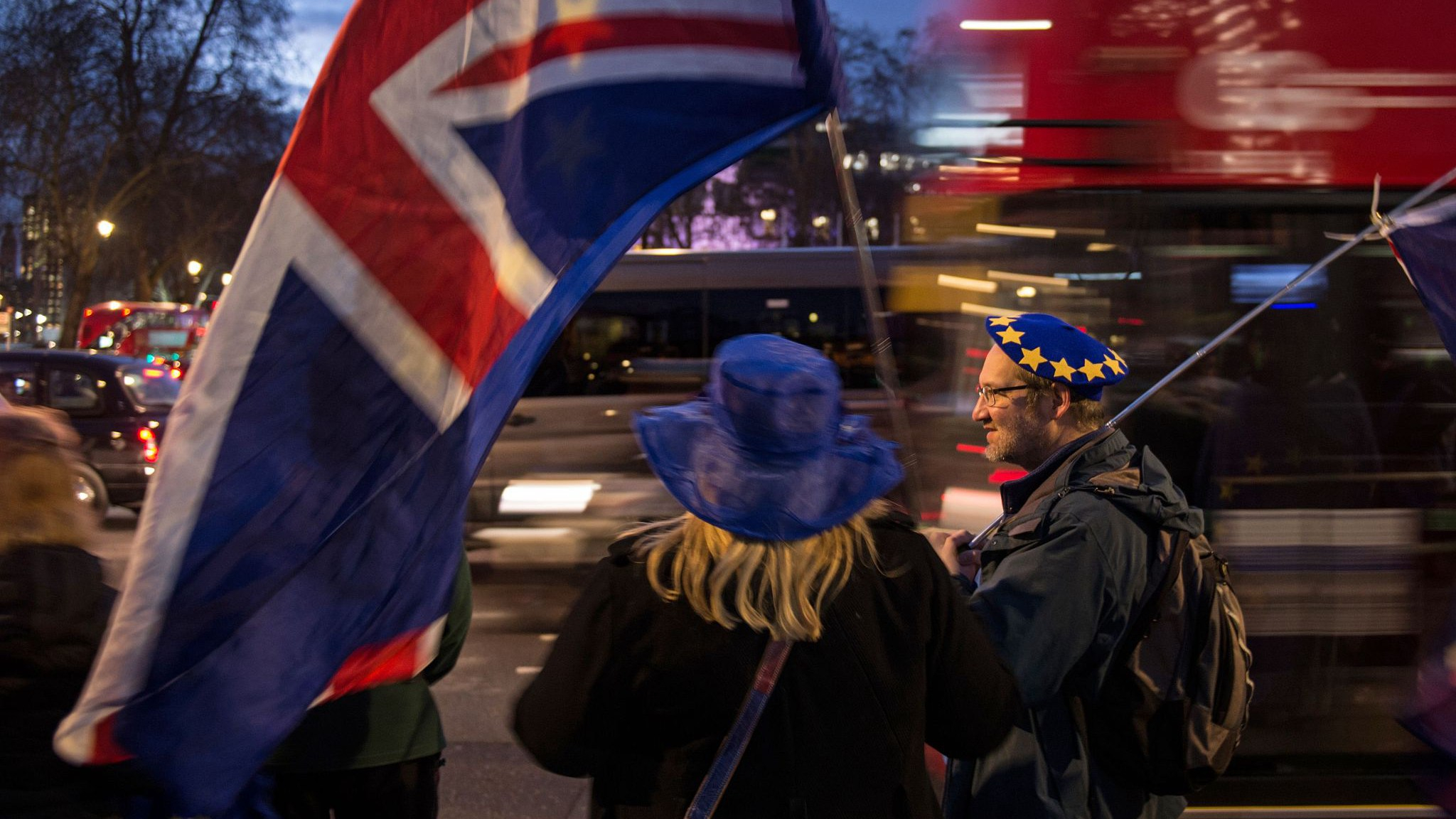Editor's note: Liu Jin is an assistant research fellow of China Institute of International Studies. The article reflects the author's views, and not necessarily those of CGTN.
UK's Parliament is scheduled to vote on the Brexit Deal tonight after a five-day debate. After rather long gaming with the government and a dramatic delay last December, the Parliament is finally getting its say on Brexit, whose result may influence the following Brexit course hugely.
What are the odds of the deal's survival?
The Brexit Deal, which consisted of a legally binding Withdrawal Agreement and a Political Declaration outline, encountered huge opposition from almost all parties since reached by British Government and EU last November.
The deal must get Parliament's approval to come into force. There are 650 seats in the House of Commons, and May needs 320 votes to pass the deal. Jeremy Corby repeatedly declared that Labor (256 MPs) will vote against the deal.
According to BBC's statistics, 100 or so Tory MPs (317 in total) and 10 of Democratic Union Party (DUP), which shore up the Conservatives' majority in Parliament, may join them.
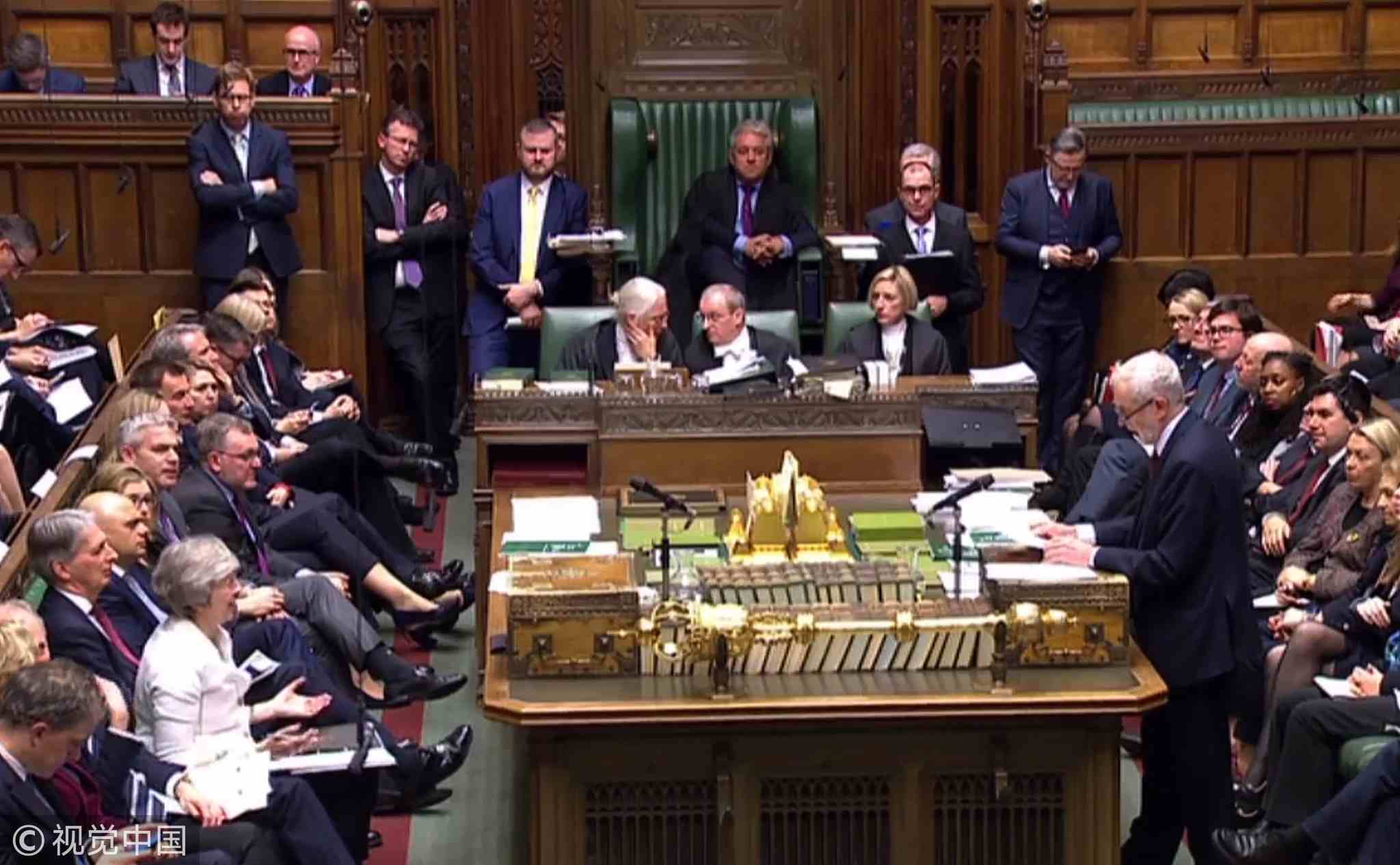
A video grab from footage broadcast by the UK Parliament's Parliamentary Recording Unit (PRU) shows Britain's Prime Minister Theresa May (3L) reacts as opposition Labour party leader Jeremy Corbyn responds to her statement to the House of Commons in London, January 14, 2019. /VCG Photo
A video grab from footage broadcast by the UK Parliament's Parliamentary Recording Unit (PRU) shows Britain's Prime Minister Theresa May (3L) reacts as opposition Labour party leader Jeremy Corbyn responds to her statement to the House of Commons in London, January 14, 2019. /VCG Photo
Scottish National Party and Liberal Democrat also expressed dissatisfaction with the deal. Reuters' latest report said 44 MPs indicated to support the deal while 115 will oppose it.
The deal's odds to survive the vote, which had been postponed by May last December and triggered an unprecedented crisis in her premiership, seems low. It seems the question matters now is not whether the government will be defeated or not, but by what margin.
Is the deal doomed to fail?
We could not give an absolute Yes to this question, however. MPs are allowed to change their minds in the vote. Facing extreme pressure of the timing, some MPs may turn to support the deal - although not necessarily in today's vote but the second one in next week or so - after got the amendments they proposed.
Postponing the vote scheduled on last December 11 to this day, which nearly cost her political career, May elevated the pressure of timing on MPs to the extreme since UK's time leaving on March 29 has been increasingly closer.
EU also holds a firm position and made it very clear that it will not re-open the negotiation. So a no-deal Brexit will become the default option if MPs rejected the deal and nothing else happens.
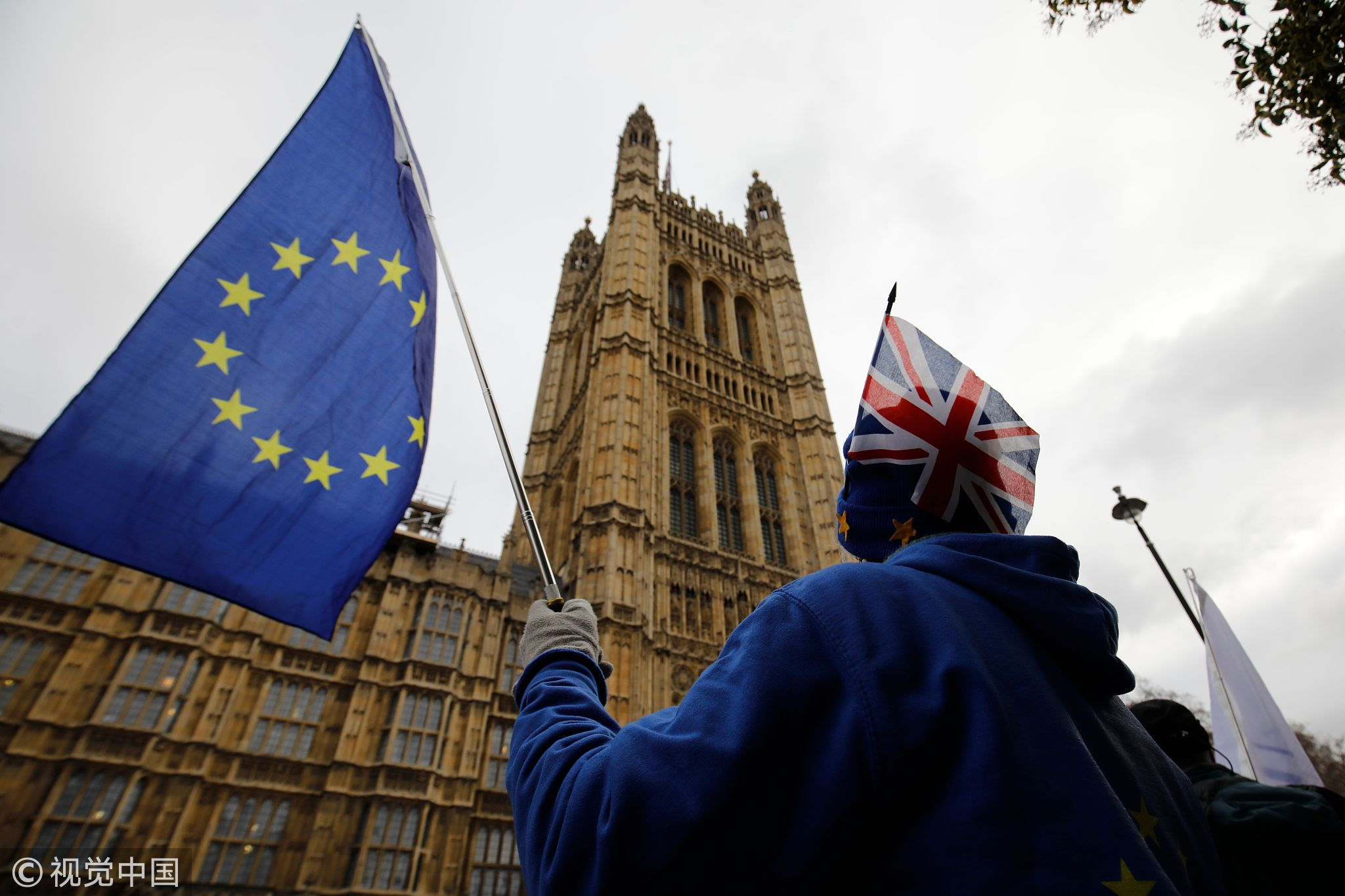
Anti-Brexit supporters hold placards and flags as they demonstrate outside the Houses of Parliament, January 14, 2019. /VCG Photo
Anti-Brexit supporters hold placards and flags as they demonstrate outside the Houses of Parliament, January 14, 2019. /VCG Photo
However, the Parliament is reluctant to shoulder the historical responsibility of no-deal as it will make significantly negative impact on UK's economy and social stability, at least in the immediate period after Brexit.
MPs even made a vote on January 8 to force the government to obtain explicit parliamentary approval before it can use certain powers relating to taxation law if no deal happens. No deal's pressure is real.
What's more crucial, MPs may get some compromises they requested, although in the form of amendments, not revision, to the deal.
The Northern Ireland Backstop, which is designed to avoid a hard border between it and the Republic of Ireland, and terms of the transition period are the two most controversial and opposed issues in the deal.
MPs are in deep concern that UK may be locked in the single customs territory with EU, or Northern Ireland more aligned with EU regulations, thus being separated in some kind from the rest of UK indefinitely if the backstop is triggered concerning it can't exit it unilaterally.
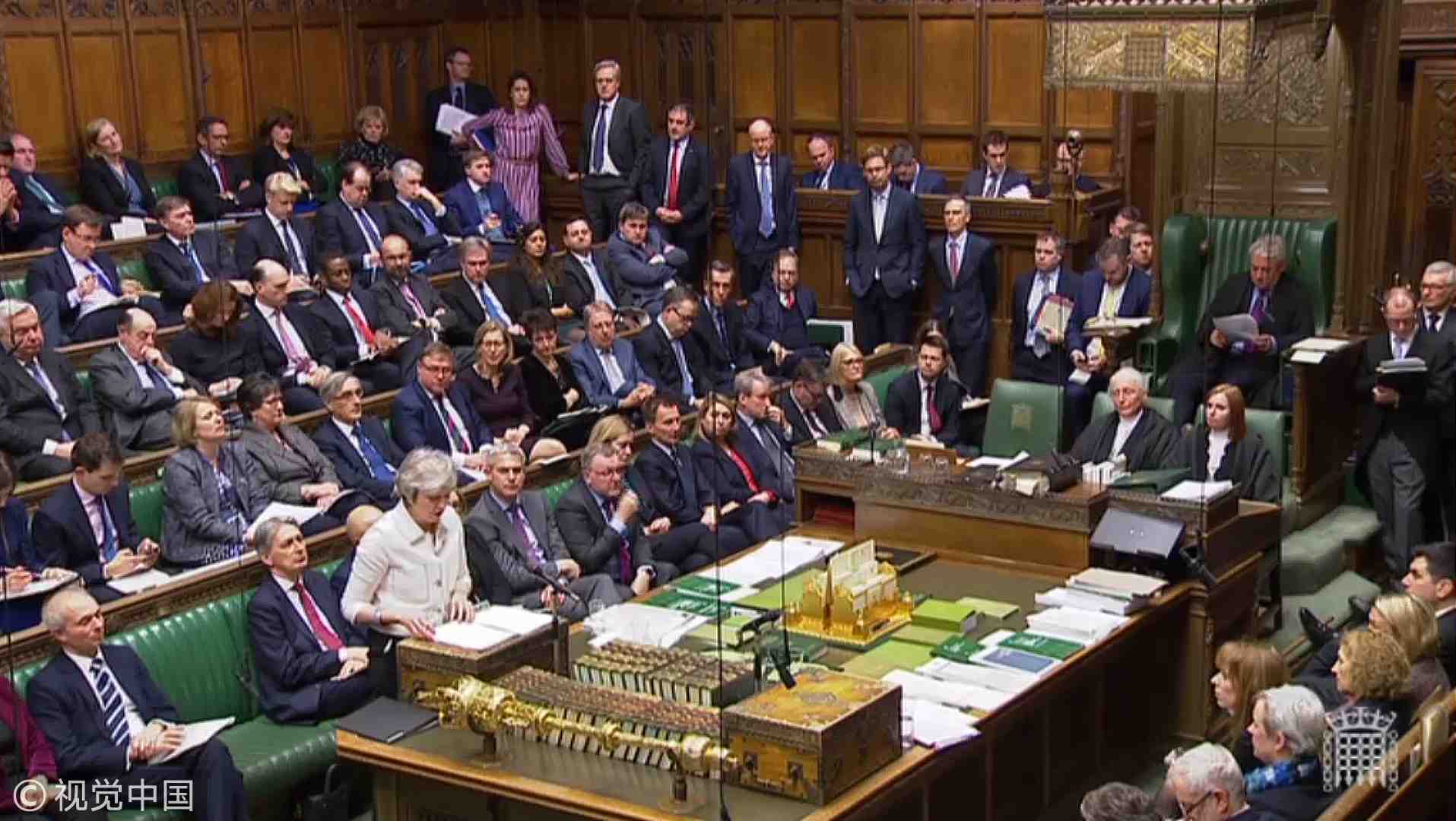
A video grab from footage broadcast by the UK Parliament's Parliamentary Recording Unit (PRU) shows Britain's Prime Minister Theresa May as she makes a statement to the House of Commons in London, January 14, 2019. /VCG Photo
A video grab from footage broadcast by the UK Parliament's Parliamentary Recording Unit (PRU) shows Britain's Prime Minister Theresa May as she makes a statement to the House of Commons in London, January 14, 2019. /VCG Photo
Besides, they complained that UK must obey all EU regulations while lost the decision power in the transition period.
May is not as stubborn as she looked like, and MPs are getting some compromises, which may be crucial to get the deal passed in a second vote.
According to BBC, the government has indicated to accept one amendment to the deal, which will give the Parliament a vote on whether to extend the transition period and whether to implement the backstop.
The government will also have the duty to agree a future relationship with EU within one year of the backstop coming into force.
EU is also offering assurances. Donald Tusk and Jean-Claude Juncker, top leaders of EU, issued a letter before the vote, promising the backstop “will not affect or supersede the 1998 Good Friday Agreement and it is intended to apply temporarily.”
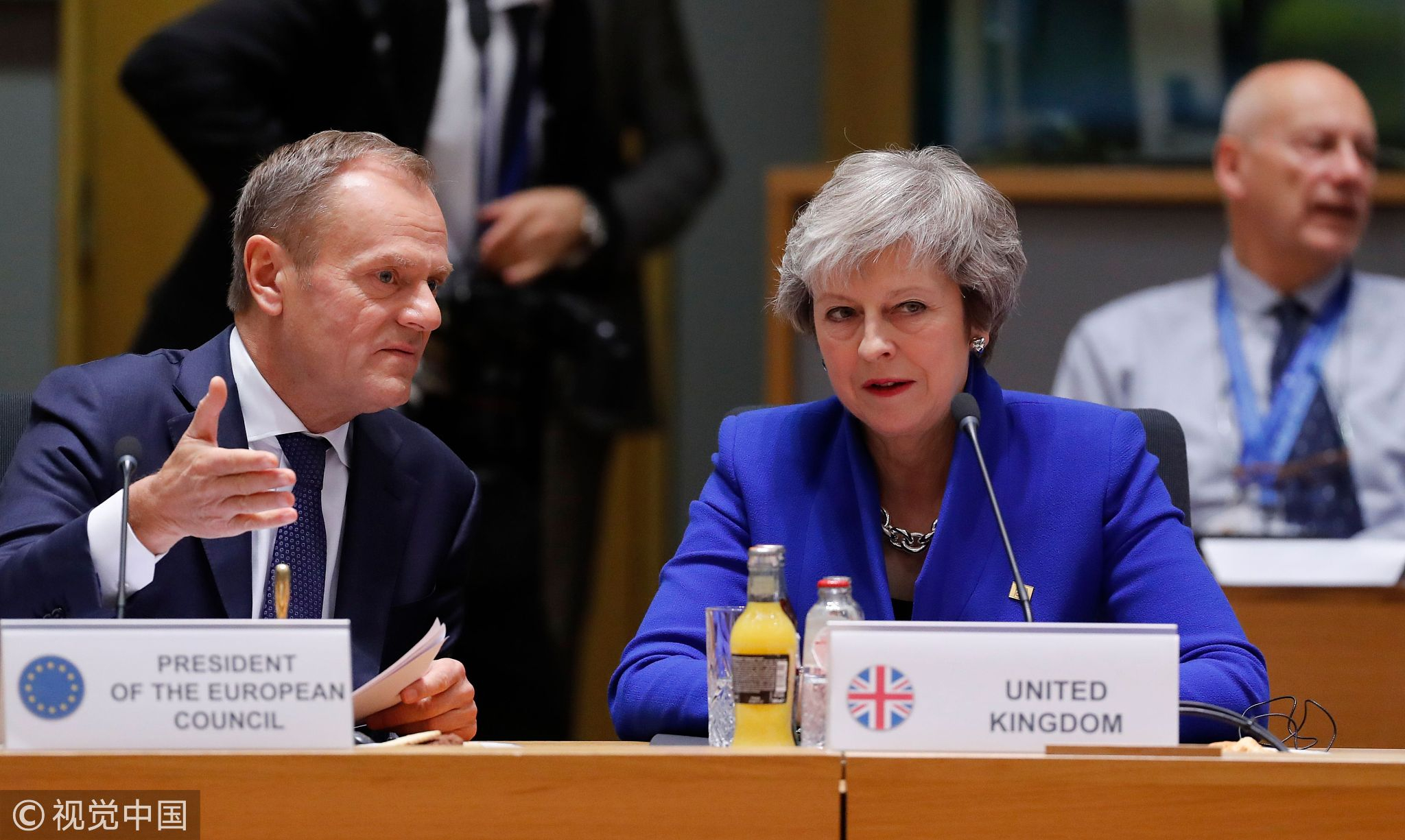
Britain's Prime Minister Theresa May (R) listens to European Council President Donald Tusk during a special meeting of the European Council to endorse the draft Brexit withdrawal agreement and to approve the draft political declaration on future EU-UK relations in Brussels, November 25, 2018. /VCG Photo
Britain's Prime Minister Theresa May (R) listens to European Council President Donald Tusk during a special meeting of the European Council to endorse the draft Brexit withdrawal agreement and to approve the draft political declaration on future EU-UK relations in Brussels, November 25, 2018. /VCG Photo
Further, based on its past records, it could not be excluded that under huge pressure to avoid the no-deal scenario, EU may make some key compromises after UK government's anticipated defeat today, helping save the deal in a second vote.
In fact, as the vote comes, some previous critics have shifted their position to support the deal. It seems that people realize that this deal may the best deal they can get.
Finally, observers must be reminded that this deal is not a failure of the UK or a single victory of EU. When no deal scenario comes, both sides will suffer, but the consensus is that UK will suffer much more than EU.
Although far from perfect for the UK, the present deal, or an amended version, do guarantee a transition period which is crucial for an orderly Brexit and pave the way for the future relationship.
(If you want to contribute and have specific expertise, please contact us at opinions@cgtn.com)

